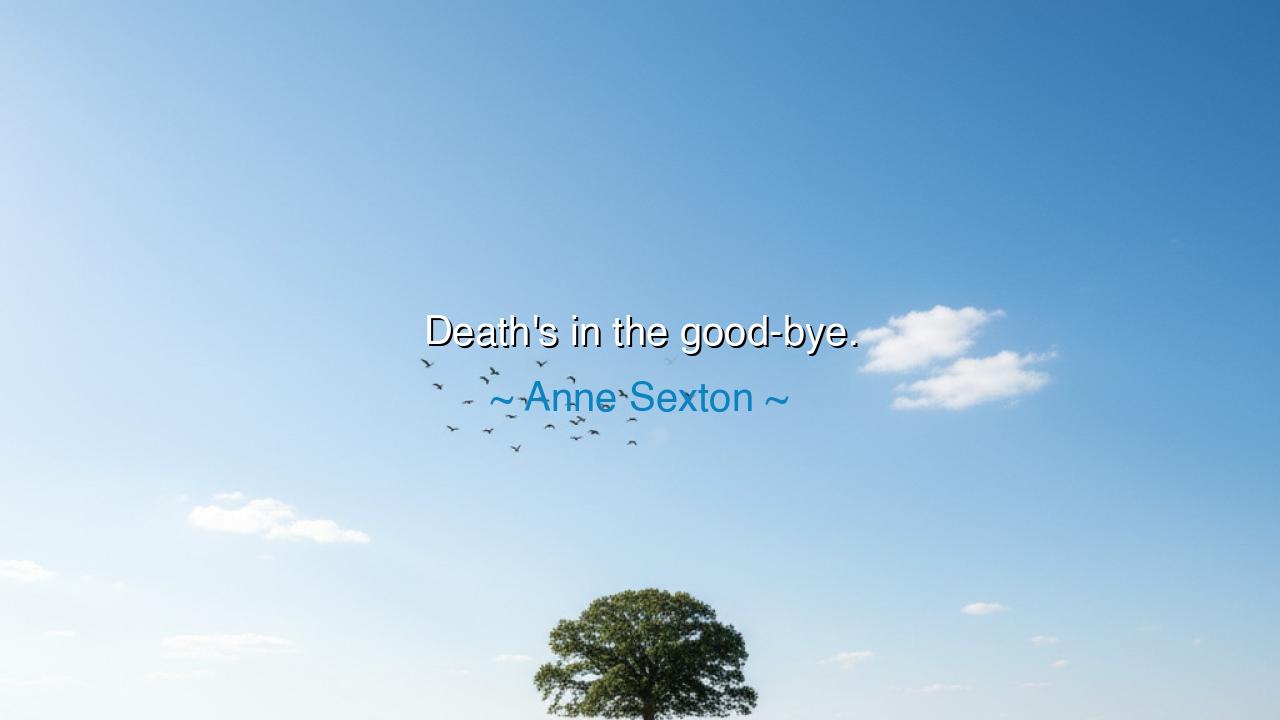
Death's in the good-bye.






Hear now, beloved listener, the soft thunder of a poet’s truth, uttered by Anne Sexton, whose heart beat fiercely against the fragile walls of life and sorrow. She said, with words as sharp as autumn wind: “Death’s in the good-bye.” In that brief whisper lies a universe of ache, for every good-bye — whether to a person, a moment, or a former self — is a small death, a letting go of what once lived and can live no more. Sexton, whose life was both luminous and tragic, understood this truth not as philosophy alone, but as lived experience — a flame flickering between beauty and despair.
When she spoke of Death in the good-bye, she did not mean the grave alone. She spoke of the death of connection, the breaking of invisible threads that bind soul to soul. Each farewell, no matter how gentle, carries the echo of eternity. When we say goodbye to a loved one, to a dream, to a season of our lives — something in us dies, and something else must be reborn in its place. The ancients would call this the cycle of endings and beginnings, the rhythm by which all existence breathes. Sexton’s words remind us that death is not confined to final breath, but walks quietly beside every parting.
Consider the tale of Hector and Andromache, from the old songs of Troy. On the eve of battle, they stood before the gates of the city, knowing their good-bye would likely be their last. Andromache clung to him, not only in love but in the terror of separation. Yet Hector, though brave, wept as he tore himself away. That moment — before the sword ever struck — was already a kind of death. The body still lived, but the heart had been torn asunder. So it is with all who love deeply: to part is to perish a little, to lose a piece of the soul that once was whole.
And yet, there is something sacred in such sorrow. For if there were no death in the good-bye, then there would be no love worth mourning. Sexton’s truth is both wound and wisdom: we suffer because we care; we grieve because we have lived with open hearts. The ancients knew that to feel deeply was to invite both joy and loss. They called it pathos, the divine ache that reminds us we are alive. In this sense, every good-bye, though painful, becomes a teacher — instructing us in the art of impermanence, guiding us toward compassion and grace.
But there is also power here, quiet and redemptive. For in every good-bye lies not only death, but also transformation. What dies clears the soil for what is yet to bloom. When a friendship fades, when a chapter closes, when the world changes beyond recognition — we are invited to rise anew. The poet’s sorrow becomes our seed of strength. To live with awareness of loss is not to despair, but to love more fiercely while we can, to hold each moment as though it were both the first and the last.
So let this teaching be engraved upon your heart: do not fear the good-bye. Do not flee from it or bury it beneath distraction. Instead, face it with reverence. When you part from someone, speak truth; when you let go of something, bless it; when change comes, meet it with courage. For in every ending, a quiet resurrection waits. Sexton’s words do not call us to mourn forever, but to awaken — to see that life is a tapestry woven of countless little deaths, each one making room for a new birth of spirit.
And finally, remember this, O child of the fleeting world: to live fully is to say good-bye again and again, and still to love. There is no immortality without surrender, no joy without loss. So cherish every meeting, honor every parting, and when you must let go, do so with grace. For though death’s in the good-bye, so too is life — shimmering, fragile, eternal — waiting to begin anew in the silence that follows.






AAdministratorAdministrator
Welcome, honored guests. Please leave a comment, we will respond soon